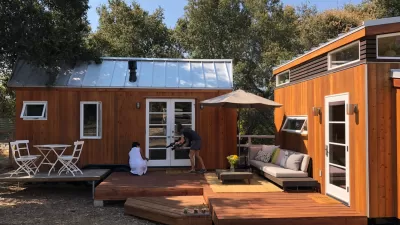Accessory Dwelling Units (ADUs) don't just help mitigate housing supply and affordability issues, they also offer significant sustainability benefits.
Margaret Morales details an under-appreciated benefit of Accessory Dwelling Units (which are sometimes known by other names, like garden suites, mother-in-law apartments, backyard cottages, or casitas). Accessory dwelling units (ADUs), argues Morales, "are a tool in the fight against climate change."
While ADUs have been commonly touted as a tool for easing the housing affordability crisis in many cities—not to mention the entire state of California, which approved ADU-enabling legislation last year—the green building angle inherent in ADU construction isn't as frequently cited.
According to Morales, "the compact size of these unassuming homes makes them remarkably energy efficient, cutting lifetime CO2 emissions by as much as 40 percent as compared with medium sized single-family homes." Moreover, "[t]hat’s far beyond the benefits of almost any other green building practice, including using green building materials, state of the art insulation, and best practices in building material waste disposal."
Morales is citing data from a 2010 Oregon Department of Environmental Quality report, which "found that a typically sized new single-family home (defined as about 2,300 square feet) built to industry standards uses nearly 60 percent more energy than a home approximately half its size [pdf[ over the course of an average 70-year home lifespan, from construction to demolition."
Morales cites all these green reasons to support and enable ADU construction as an appeal to cities and communities in the Pacific Northwest. Supply of ADUs is limited in cities like Seattle, due to regulatory hurdles, according to Morales, despite increasing interest in the option.
FULL STORY: THE FORGOTTEN GREEN HOUSING OPTION: ACCESSORY DWELLING UNITS

Maui's Vacation Rental Debate Turns Ugly
Verbal attacks, misinformation campaigns and fistfights plague a high-stakes debate to convert thousands of vacation rentals into long-term housing.

Planetizen Federal Action Tracker
A weekly monitor of how Trump’s orders and actions are impacting planners and planning in America.

Chicago’s Ghost Rails
Just beneath the surface of the modern city lie the remnants of its expansive early 20th-century streetcar system.

Bend, Oregon Zoning Reforms Prioritize Small-Scale Housing
The city altered its zoning code to allow multi-family housing and eliminated parking mandates citywide.

Amtrak Cutting Jobs, Funding to High-Speed Rail
The agency plans to cut 10 percent of its workforce and has confirmed it will not fund new high-speed rail projects.

LA Denies Basic Services to Unhoused Residents
The city has repeatedly failed to respond to requests for trash pickup at encampment sites, and eliminated a program that provided mobile showers and toilets.
Urban Design for Planners 1: Software Tools
This six-course series explores essential urban design concepts using open source software and equips planners with the tools they need to participate fully in the urban design process.
Planning for Universal Design
Learn the tools for implementing Universal Design in planning regulations.
planning NEXT
Appalachian Highlands Housing Partners
Mpact (founded as Rail~Volution)
City of Camden Redevelopment Agency
City of Astoria
City of Portland
City of Laramie





























